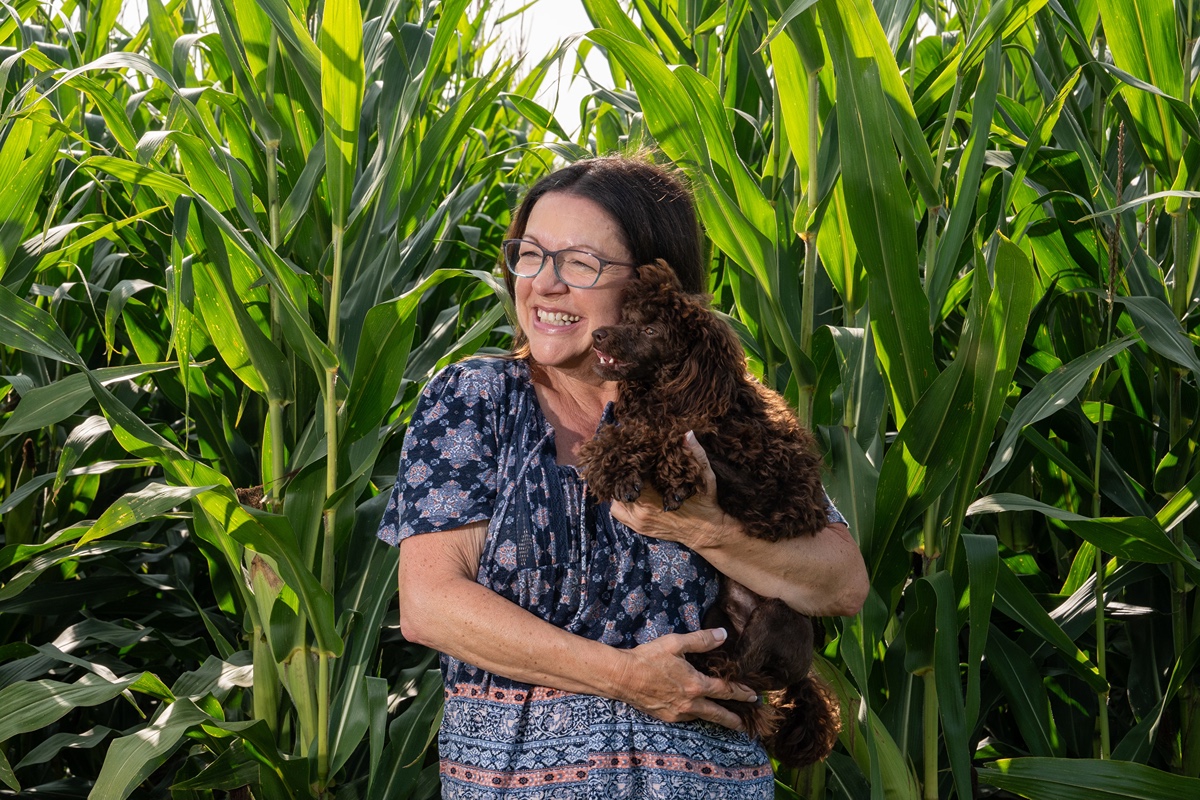Behind the Research: Kimber Nicoletti-Martinez, MSW, LCSW
About the feature
Many people are involved in the remarkable range of programs, services and facilities that undergird research in the College of Agriculture. Collectively they’re integral to the college fulfilling its research mission. “Behind the Research” explores their individual roles. Each academic year, we profile six people whose work supports the College of Agriculture’s global reputation for developing innovative, multidisciplinary solutions to challenges and then putting those solutions into action.
Kimber Nicoletti-Martinez, director, MESA and Latino farmworker outreach coordinator, AgrAbility Project
- Has advocated for Latinx immigrant and farmerworker communities for more than 25 years.
- In 2008 founded Multicultural Efforts to end Sexual Assault (MESA), a Purdue Extension program thatoffers community-based solutions for healthier communities free of violence.
- Through the USDA-funded AgrAbility Project, helps Extension and other rural professionals understand the special needs of farmers and agricultural workers with disabilities.
When Kimber Nicoletti-Martinez saw a need among Indiana farmworker families, she started a drive for donations of gently used clothing, toys, baby items and furniture. From that modest start in 2002, Nicoletti-Martinez has become a nationally recognized advocate for a population throughout the state that often goes unseen by others.
“I chose social work because I wanted to make a difference in the lives of people,” she says.
Nicoletti-Martinez, who has a farmworker background, says she “grew up all over the place.” She earned a bachelor’s degree in sociology at Purdue in 1996 and, because she was a single mother, commuted to Indianapolis to complete a master’s in clinical social work at IUPUI to avoid uprooting her children. Between her undergraduate studies and 22-year career at Purdue, she has lived in West Lafayette longer than anywhere else.
Her first professional position at Purdue was as the minority outreach coordinator with a 4-H program focused on ending sexual abuse. It would also be her starting point for securing over $2.5 million in foundation, federal and state grants.
“I don’t even know how I learned to write grants,” she says. “I’d never been on any hard funds at Purdue University, and I was really vested in doing this child sexual abuse work in farmworker communities, because that’s near and dear to my heart. I can only imagine how crazy my first grant proposal looked because I didn’t know anything about writing a grant, but I got $75,000 in 2008, and that’s how I started the MESA program.”
Nicoletti-Martinez’s work is still entirely grant-funded. She is part of Purdue’s Agricultural Sciences Education and Communication (ASEC) department and functions as a complementary state Extension specialist.
As a principal investigator of several grants, Nicoletti-Martinez has administrative and reporting responsibilities. However, she would rather travel the state delivering capacity-building programs and facilitating workshops for farmworkers.
“Grant writing is not where my strengths lie; my strengths lie in engaging people,” she says. “The opportunity to make a difference is my life’s calling.”
Nicoletti-Martinez once aspired to a singing career and frequently brings the arts into her work. “Farmworkers and farmers — both populations are really stoic people,” she explains. “I do a lot of arts-based work with farmworkers, getting people to talk about feelings.”
Her work with the AgrAbility Project to support farmworkers with disabilities — diabetes, arthritis, asthma and mental health conditions are examples — “allows me to have a more comprehensive view of the work that I do with farmworker communities,” she says.
She had worked with one group in Elwood for several years and thought she’d made progress, although participants were still reluctant to practice the leadership and public speaking skills she had subtly taught them. Nicoletti-Martinez decided to test them. When a mysterious “illness” overtook her at a meeting, two men stepped up to ably facilitate the workshop. “I will forever remember that experience, because I realized that for me that was impact,” she says. “I felt like I had made a difference.”
Many at Purdue are familiar with her campus-wide requests for support. “When people say, ‘Your name sounds familiar,’ I tell them it’s because I’m always begging for stuff,” Nicoletti-Martinez says of her drives for school supplies and holiday gifts for farmworker families.
“In the beginning, people would say, ‘There’s farmworkers in Indiana? Where are they?’” she says. “Farmworkers have been in Indiana for a long time, but a lot of times they’re invisible to other residents of the state. Most of the time I work with Latino farmworkers, but we’ve had an increase in other kinds of refugee populations doing farmwork in Indiana,” she says, citing Haitian and Burmese agricultural workers.
During her career, she also has noted changes in growing seasons and the movement and needs of migrant seasonal workers. “But farmers and farms still rely on farmworkers to help get crops planted and get crops harvested,” she says.
As she travels, Nicoletti-Martinez is also a resource for information about Indiana’s migrant education program and national farmworker job training program. And sometimes, she’s an ambassador for the local high school, vocational training, community college or Purdue.
“Because education was so important in my own development, I really like to support other people in theirs,” she says. Over the years, Purdue undergraduates have worked for her as student workers, and she has mentored graduate students in public health.
Nicoletti-Martinez received the 2021 National Jefferson Award for Outstanding Public Service for her work with the migrant farmworker community. She was Indiana’s 2017 Social Worker of the Year and was named National Social Worker of the Year in 2018 by the National Association of Social Workers.
The awards motivate Nicoletti-Martinez to do more. “The need is so great, and I’m one person, and I just sometimes wish I had better solutions than I do,” she says.







